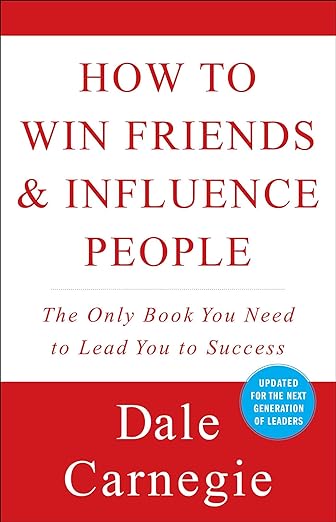In conclusion, is a timeless classic that offers valuable insights on how to cultivate meaningful relationships and influence people in a positive way. This book provides practical advice and real-life examples that can be applied to various situations. It covers topics such as effective communication, building rapport, and understanding human psychology. By implementing the principles outlined by Dale Carnegie, readers can develop strong interpersonal skills and enhance their personal and professional relationships. Additionally, provides access to free online resources, including audio recordings and additional reading materials, to further support the learning experience.
- One of the most influential books ever
- Offers practical advice on building meaningful relationships
- Provides valuable insights for personal and professional growth
- Some examples may feel dated
- The title may be off-putting and misleading
- Not specifically focused on making friends, more on leadership and influencing others
In conclusion, The Rich Dad Poor Dad book is a must-read for individuals seeking to gain financial knowledge and reshape their mindset. It offers empowering lessons on financial literacy, investing, and wealth creation. This book emphasizes the importance of financial education and provides practical tips for building wealth. Readers can access free online resources, including educational videos and interactive tools, to enhance their understanding and application of the concepts discussed. By reading The Rich Dad Poor Dad book and utilizing the accompanying resources, individuals can gain the knowledge and confidence needed to achieve financial success.
- Empowering Financial Wisdom – “Rich Dad Poor Dad” is a Must-Read!
- Relatable Storytelling and Practicality
- Emphasis on Financial Literacy and Mindset Shift
- Questionable Authenticity of Childhood Experiences
- Repetitive Structure
- Strong American Influence
In conclusion, The Intelligent Investor Rev Ed. is a timeless investment classic that offers practical advice for value investors. This book provides insights into the principles of intelligent investing, including the importance of thorough analysis and long-term thinking. Benjamin Graham’s wisdom, complemented by Jason Zweig’s commentary and Warren E. Buffett’s endorsement, makes this book a valuable resource for investors of all levels. Additionally, readers can access free supplementary materials, such as case studies and investment templates, to further enhance their understanding and application of the concepts discussed in the book.
- The Intelligent Investor provides a wealth of wisdom and knowledge for investors.
- The book offers practical and timeless investment advice.
- The commentary by Jason Zweig helps bridge the gap between Graham’s teachings and the modern financial landscape.
- The book can be challenging to read and may require multiple readings to fully grasp the concepts.
- Some sections of the book, particularly Zweig’s commentary, may depart from Graham’s original teachings.
- Certain aspects of the book, such as suggestions for handling stock certificates, are no longer relevant in today’s digital age.
In conclusion, Thinking, Fast and Slow is a must-read for anyone interested in gaining a deeper understanding of the way our minds work and the factors that influence our decision making. This book provides a comprehensive exploration of cognitive biases, heuristics, and the two systems of thinking. Daniel Kahneman’s expertise and extensive research make this book an invaluable resource for individuals seeking to enhance their critical thinking skills and make more informed choices. Readers can access free online resources, including additional case studies and interactive quizzes, to further engage with the content and apply the concepts to real-life situations.
- Provides a deep understanding of the decision-making process: “Thinking, Fast and Slow” delves into the two systems of thinking that drive our decisions, helping readers gain insight into how their minds work and the biases that can influence their choices.
- Offers practical applications: The book provides numerous real-life examples and scenarios that allow readers to apply the concepts to their own decision-making processes, making it a valuable resource for personal growth and development.
- Written by an expert in the field: Daniel Kahneman, a Nobel laureate in Economics, brings his extensive knowledge and expertise to the book, ensuring that the information presented is based on solid research and insights.
- Dense and challenging read: Due to the complex nature of the subject matter, some readers may find the book difficult to comprehend and may need to invest more time and effort into understanding the concepts.
- Lack of actionable steps: While the book provides a deep understanding of decision-making processes, it may not offer clear, step-by-step guidance on how to apply this knowledge in practical situations.
- Limited focus on specific industries: The book primarily focuses on decision-making from a general perspective and may not provide as much industry-specific insight for readers looking for more targeted information.
In conclusion, The Rich Dad Poor Dad for Teens is a valuable resource that can help teenagers gain a better understanding of financial literacy and develop a mindset focused on financial success. This book covers essential topics such as budgeting, saving, investing, and entrepreneurship in a relatable and engaging manner. It provides practical advice and inspiring stories to empower young readers to take control of their financial future. Additionally, readers can access free online resources, including interactive tools and educational videos, to further enhance their financial knowledge and skills.
- Provides valuable financial education for teenagers.
- Written from the perspective of the author’s personal experiences.
- Encourages the development of an entrepreneurial mindset.
- Lacks specific investing advice.
- Can be repetitive in its messaging.
- Some readers question the authenticity of the author’s childhood experiences.
